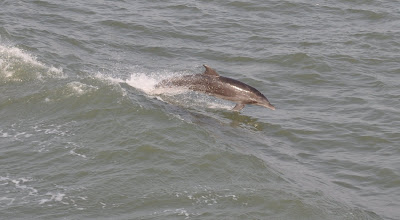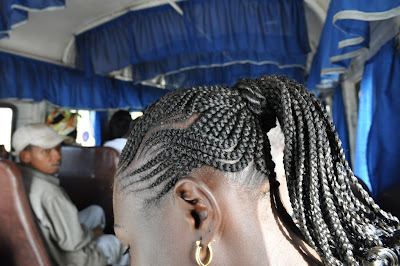
A long morning of re-constructing my previous three months' writing and I felt I needed a long walk on the beach. Here and there, dotted along the wide white sandy stretch were the gnarled stumps of dead trees, twisted with fishing wire, blue and aquamarine ropes, a coat-hanger, someone's lost flip-flop. Some of the stumps were coated with greasy green seaweed that made them look like the hairy backs of deep-sea creatures. A lightbulb lay broken on the sand.
"What do you think of people who get annoyed quickly?" said A., one of the guesthouse's workers who had offered to accompany me on the long walk to the end of the island. As there was no one about, only a lonely fisherman straightening his nets, I had accepted A.'s offer of company, remembering what happened to Martha Gellhorn on a beach in Kenya. I didn't want to be raped in a place that had the illusion of being so cut off from the world that not even crime existed.
I wondered if A. was meaning me. I admit that things piss me off quickly and years of travel in slightly annoying places has done nothing to teach me that I always regret it afterwards; I am still the easiest person to annoy.
"Well," I said, trying to sound as cool as anything. "People are different all over the world. Some people store it up and let it out later, some people show their annoyance as it's happening." Was that a diplomatic response, I wondered hopefully.
"Yes but," went on A, starting to annoy me. "It's bad to get annoyed."
"Maybe," I said, singing to myself and looking out to sea, trying to block out the sound of his voice. "People are different."
"But you," he went on, really wanting a proper answer. "You're not like that. You're Seno-Gauloise now."
That did it. Dreadlocked ganja-smoking idiots in the centre of town accused me of being Seno-Gauloise, the supposedly flattering term that the Senegalese give to anyone who can say one word of Wolof and which means that you have transcended your Frenchness to become almost a Senegalese national. The jibe usually leads to an offer of some wood carving painted with black boot polish, and an accusation of being a racist if you don't give in and buy it. I usually respond by walking infront of a fast-moving taxi, hoping they will follow me and be run down.
I responded breathily to A. that I was neither Senegalese nor French.
"Yes but you're a toubab, and toubab is toubab." All whites are the same.
With no taxi in sight I raised my voice and said, "that pisses me off." We carried on our walk in silence and I wished, ashamed, that the sea would just go on and swallow me up.







